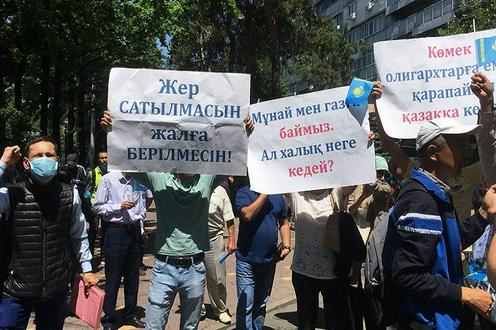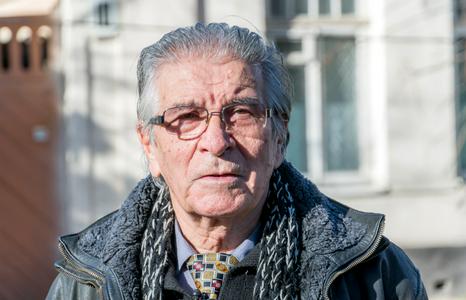Demonstrations previously announced by the Democratic Party of Kazakhstan and supporters of Mukhtar Ablyazov, the leader of the banned movement Democratic Choice for Kazakhstan, have taken place in cities across Kazakhstan, Fergana’s correspondent reports.
In Almaty demonstrators carrying Kazakh flags and signs calling for an end to Chinese expansion and an amnesty on loan repayments gathered at the intersection of the Abay and Nazarbaev avenues. Another hundred people gathered at the intersection of Kurmangazy Street and Dostyk Avenue. Initial reports state that around 30 demonstrators were arrested.
The municipal authorities chose the same moment to carry out disinfection work at the site of the protests. Several vehicles arrived carrying disinfectant substances and a team of municipal workers in hazmat suits sprayed pavements and benches. Demonstrators moved out of the way and then returned to their original positions.
According to RFE/RL’s Kazakh service Azattyq, police in the north-eastern city of Semey arrested around 20 individuals on their way to the demonstration there before the event had even begun. Participants were arrested not only on the city’s central square but also on adjacent streets.
Arrests were also carried out in Nur-Sultan around Qazaq Eli Square. KazTag writes that security forces closed off the square itself and four city quarters around it, including the area around the Hazrat Sultan mosque and the park of the first president.
The Democratic Party of Kazakhstan organised the demonstrations in accordance with the country’s new law on public assembly, ratified by President Qasym-Zhomart Toqaev on 25 May and promoted as a transition to a notification system of public assembly. Notification of the demonstrations was handed in to local akimats (mayoral offices) in various cities around the country. However, the authorities refused to allow the events to go ahead, pointing out that the law had not yet entered into force. Officials cited article 21 of the new law, in which it is stated that the law enters into force 10 calendar days after its official publication.
Yesterday, Almaty’s chief medical officer, Zhandarbek Bekshin, reminded the city’s residents that mass events were prohibited in the city during the COVID-19 epidemic. He also warned that video recordings would be made of the demonstrations and participants would be quarantined if any infections were traced to the event. “Those who are infected with COVID-19 will be isolated in infectious diseases hospitals. All those who have come into contact with them – both at the site of the mass gathering and at their homes – will be placed in provisional and quarantine hospitals,” he said. Organisers, he said, could face criminal charges if such gatherings lead to new cases of the virus.
Kazakh health minister Yelzhan Birtanov also called for demonstrations to be postponed during the coronavirus epidemic, since they were tantamount to “forcing people or urging them to participate in a very dangerous event for the public”. DPK activists, however, responded that they would hold the demonstration while observing all necessary sanitary regulations.










